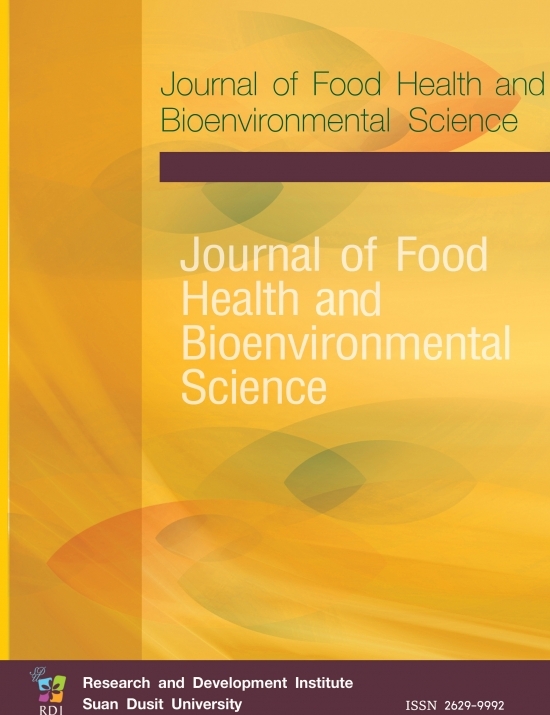Expectancy on Being Older Persons and Self-Preparation for Old Age in Middle-Adults: Bang Phlad, Bangkok Metropolis
Keywords:
Expectancy on Being Older Persons, Self-Preparation for Old Age, Middle-AdultsAbstract
The purposes of this study were to assess the level of expectancy on being older persons and of the self-preparation for old age in middle-aged adults (ages between 35-60 years); and to estimate an equation to predict the self-preparation of middle-aged adults from the demographic factors and the expectancy on being older persons. The sample of 400 persons were recruited from middle-aged adults who were qualified with the predetermined criteria, using multi-stage random sampling technique. Data was collected using the questionnaire, developed by the researchers, consisted of 3 sections: the personal data, the expectancy on being older persons and the self-preparation for old age. The CVIs of sections 2 and 3 of the questionnaire were 0.97 and 1.0 with reliabilities of 0.92 and 0.93 respectively.
It was found that the expectancy of the sample on being older persons in general was at a high level (Mean 4.07, S.D. 0.66) and the self-preparation for old age in general was also at a high level (Mean 4.00, S.D. 0.55). The variables, which were analyzed using chi-square tests and Pearson’s Product Moment Correlation test and found significantly associated with the self-preparation for old age, were later included to formulate a prediction equation of the dependent variable.
The Stepwise multiple regression analysis revealed the equation that best predicted the self-preparation for old age, with the Coefficient of determination (R2) of 0.467 (R=.685). The equation included independent variables as follows: the expectancy on being older persons on spiritual and physical aspects, working for government/state enterprise/private company, practicing Buddhism, and having education at vocational certificate or higher levels. The implications of research findings and recommendations for future practice were discussed.
References
Department of Provincial Administration, Ministry of Interior. (2019). Statistics of the elderly in 77 provinces of Thailand on 31 December 2018. Retrieved from http://www.dop.go.th/download/knowledge/th1550973505-153_0.pdf
Department of Provincial Administration, Ministry of Internal Affairs. (2016). Statistic registry system: Thai population by age in December 2015. Retrieved from http://stat.dopa.go.th/stat/statnew/upstat_age_disp.php.
Ekpalakorn, W. (2014). 5th Health survey report of the Thai people by physical examination B.E. 2557 by Health Systems Research Institute, Nonthaburi. Retrieved from http://thaitgri.org/?p=37869
Foundation of Thai Gerontology Research and Development Institute. (2016). Situation of the Thai elderly 2016. Retrieved from http://www.dop.go.th/download/ knowledge/th1512367202-108_0.pdf Foundation of Thai Gerontology Research and Development Institute. (2017). Situation of the Thai elderly 2017. Retrieved from http://www.dop.go.th/th/know/2/147
Hair, J.F., Black, W.C., Babin, B.J., & Anderson, R.E. (2010). Multivariate data analysis: A global perspective (7th ed.). Upper Saddle River, NJ: Pearson Education.
Hutchison, E.D. (2001). A life course perspective. Chapter 1. Retrieved from http://www.sagepub.com/sites/default/files/upmbinaries/36521_CLC_Chapter1.pdf
Israel, G.D. (2009). Determining sample size. Retrieved from https://www.gjimt.ac.in/wp-content/uploads/2017/10/2_Glenn-D.-Israel_Determining-SampleSize.pdf
Katisrivorapan, S. (2008). Psycho-social factors related to retirement preparation behavior of the teachers of Udonthani education service area office 1. (Master’s thesis). Srinakharinwirot University, Bangkok, Thailand.
Meankerd, W. (2006). Values and expectations of older persons and younger generations. Bangkok: Mister Copy. Management Study Guide Website. (2016). Expectancy of motivation theory. Retrieved from https://www.managementstudyguide.com/expectancy-theorymotivation.htm#
Marriage and Family Encyclopedia. (2016). Life course theorykey principles and concepts. Retrieved from http://family.jrank.org/pages/1072/Life-Course-TheoryKey-PrinciplesConcepts.html
Maslow, A. (1954). Motivation and personality. NY: Harper. Nantsupawat, W. (2009). Nursing care for elderly: Challenges and aging population status. Khon Kaen: Khon Kaen Publishing.
National Statistical Office. (2013). Report on the 2007 survey of the older persons in Thailand. Retrieved from http://service.nso.go.th/nso/nsopublish/service/survey/rep_older50.pdf
National Wellness Institute. (2019). About wellness. Retrieved from https://www.nationalwellness.org/page/About
Wellness Pattrapakdikul, U., Arphornthip, A., & Thamsuwan, A. (2011). Factors related with self preparation for aging of personnel in Faculty of Medicine, Prince of Songkla University. Journal of Gerontology and Geriatric Medicine, 12(1), 21-31.
Pooprasert, P. (2018). Wisely older 60 towards…ageing society with understanding. Retrieved from https://mgronline.com/qol/detail/9610000082863
Ratchaneeladdajit, P. (2012). Dietary pattern, nutritional status, quality of life, and preparation for older age of teachers in Kanchanaburi educational service area 1. (Master’s thesis). Kasetsart University, Bangkok, Thailand.
Rittirong, J., Prasartkul, P., & Rindfuss, R.R. (2014). From whom do older persons prefer support? The case of rural Thailand. Journal of Aging Studies, 31, 171-181.
Stoewen, D.L. (2015). Health and wellness. The Canadian Veterinary Journal, 56(9), 983-984.
Teewunda, D., & Sanjai, M. (2010). The role and needs of caregivers and health care needed of the elderly in region 7. Retrieved from http://advisor.anamai.moph.go.th/253/25309.html
Tirakanant, S. (2012). Multivariate analysis in social science research (2nd ed.). Bangkok: Chulalongkorn University Press.
University of California, Davis Campus. (2019). What is wellness? Student health and counselling services website. Retrieved from https://shcs.ucdavis.edu/wellness/what-is-wellness
World Health Organization. (2002). Active aging: A policy framework. Retrieved from http://apps.who.int/iris/bitstream/10665/67215/1/WHO_NMH_NPH_02.8.pdf
Downloads
Published
How to Cite
Issue
Section
License

This work is licensed under a Creative Commons Attribution-NonCommercial-NoDerivatives 4.0 International License.








